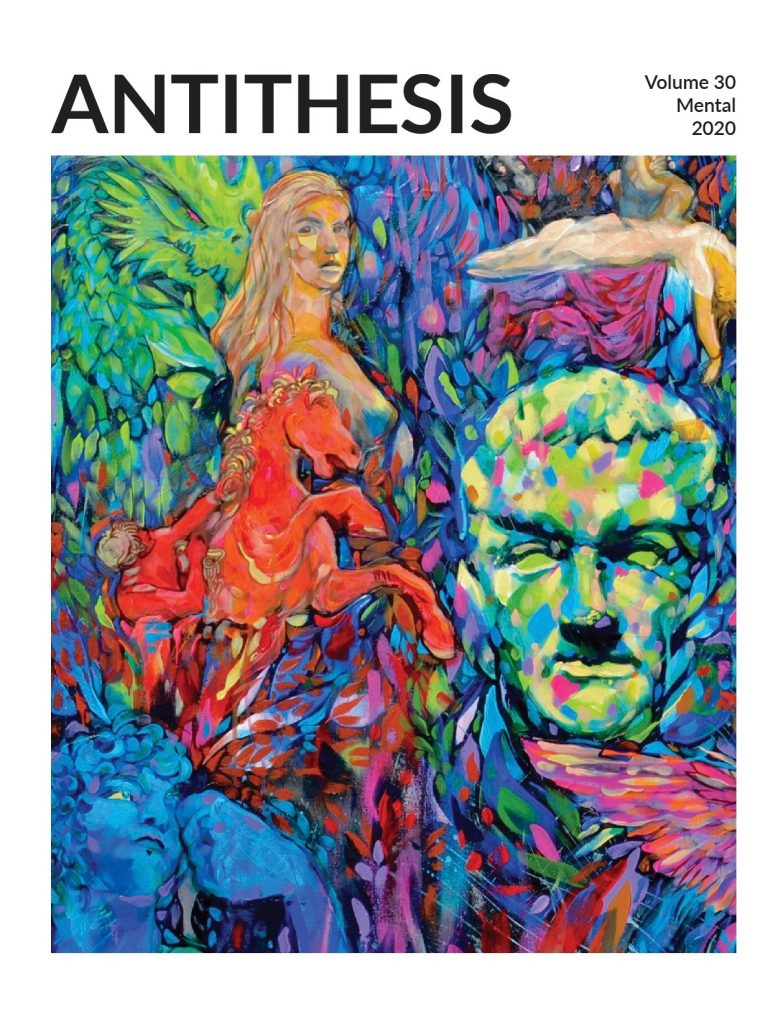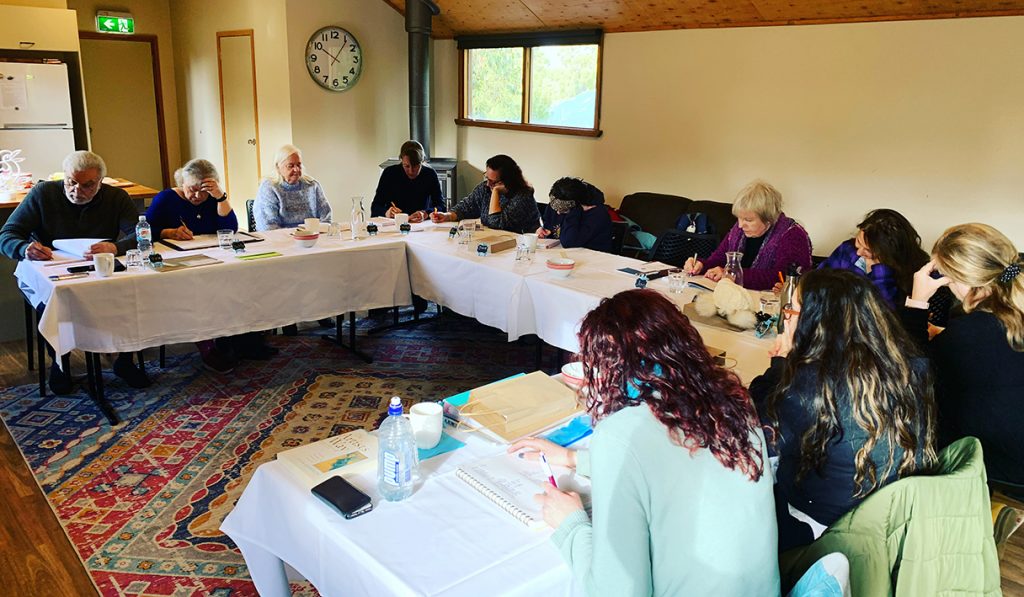

Busybird
Welcome to the Busybird blog, where you can find helpful articles, updates, industry news and more. Make sure you stay up to date by signing up to our newsletter below.
Hurdles, Hope and COVID Era Publishing
September 22, 2021
We had a place, a designated café that we always used for interviews. Decent coffee, if not overpriced, with a trendy postgrad hangout vibe. It was February 2020, and my third year as an editor for Antithesis, the postgraduate arts and humanities journal for the University of Melbourne.
After working my way up, I had landed the top job as Editor-In-Chief and my brain was as bursting with ideas as it was with the practicalities of production. I excitedly collected names of creatives I wanted to commission, fantasising about layouts and the diversity of voices I wanted to capture while also screeching at myself about the things that must be done; advertising, grant applications, printing quotes. At the beginning of the year, I had interviews to do, about twenty of them, and I wanted my café and coffee. But already, there was a definitive tension in the city. Cafes – shock horror – were closing, and there was buzz about a lockdown, not that I was sure what that meant.
My lead creative editor and I met our editorial candidates at a nearby library, all of whom were excited, passionate, over-qualified as always, and ready to get to work. As a new team, we created a journal that exceeded even my own very high expectations. Together, we meticulously commissioned and edited a huge array of voices speaking to the lived experience of mental ill-health, disability and adversity. Topics ranged from testifying to the Royal Commission Into Victoria’s Mental Health System to overcoming warfare-induced PTSD. I was immensely proud to have spearheaded a publication so immensely and unforeseeably relevant to the times. Yet never did I see my team in person again.
The next time I would see my lead editor would be, ironically, in a café in Thornbury eight months later. With a box of our completed journals sitting on the table, I walked over to her as she entered.
With equal parts joy and sheer exasperation, she asked me, ‘How are you?’
I never did answer that question. All I could say was ‘Can I give you a hug?’
And we just stood there embraced. For a good few minutes.
Without words, we thanked each other. We acknowledged the phenomenal teamwork and dedication it required to bring our journal to print, against all odds, in the worst global health crisis of the modern age.
The production of Antithesis: Mental, like all of the publishing industry, was forced to adapt in 2020. Our journal might as well have been sponsored by Zoom and Facebook Messenger. The work got done, and it got done well, yet invariably missing was the in-person contact so critical to facilitating a sense of camaraderie and rich, in-depth discussion of submissions. Also removed was the opportunity to meet with our writers to discuss their work in addition to in-person promotional events. The art of schmoozing was rudely disrupted, along with access to the opportunities that may follow.
My team worked throughout all of the uncertainties that COVID-19 threw into their personal lives, from employment instability, financial insecurity and the demands of home-schooling children. Simultaneously, I oversaw production whilst continuously re-shaping my approach and the how of publishing, navigating curveballs and questions that I could never have foreseen;
Will writers still be able to work on their pieces in this time?
Will my team be able to keep going?
Will our printer stay open? What if it doesn’t?
How are we going to launch? In-person? Online?
What about sales strategy? With an online launch, we won’t have a sales table.
The challenges were continuous, all-encompassing and pervasive, demanding constant openness to change. Yet never did our team lose sight of the importance and relevance of our material; a curation of resilient voices in the face of adversity. And it was this critical relevance to the ever-evolving struggles so raw and universally present that saw us through to publication.
COVID-19 has critically impacted the publishing industry on a global scale, from conglomerate publishers right down to graduate student-run journals. The virus has facilitated an increasing shift to digital publications, enforced socially distanced working arrangements and hindered the scope of both marketing and networking opportunities. Student publication committees hold their breath as they await grant application outcomes, their viability entirely reliant on what tertiary institutions can feasibly offer.
Yet research suggests that demand has not decreased. Readers are still reading, whether for the love of it, as distraction from the world or as a lockdown time-filler. While some may escape into fantasy novels and others into romance fiction, where dinner dates are possible and COVID doesn’t exist, others pick up a text in the hope of finding a voice that speaks to their own pain and struggle. The written voice is not bound by COVID, and in this era of lockdowns, words remain a source of comfort and insight when we can’t bear witness to them personally. And the fact the world still wants them, and perhaps sometimes clings, is enough for this editor to fight another day, no matter what it brings.
Antithesis is the graduate student-run arts and humanities journal for the University of Melbourne, publishing fiction, creative non-fiction, poetry, artwork and scholarly articles in an annual print edition, in alignment with a theme. Antithesis: Mental is on sale now.
Sophie Raphael is a writer, editor and mental health peer support worker based in Naarm. She is passionate about mental health writing from both the lived experience and scientific perspectives and is a strict non-fiction fanatic. A current intern at Busybird Publishing, Sophie has also volunteered with Meanjin and Overland, and was the 2020 Editor-In-Chief at Antithesis Journal.
Sophie Raphael
Publishing Intern
The Scratching of Pen Nibs
July 6, 2021
Review of the Winter Solstice Writing Retreat, June 2021
Kinglake, Victoria is surrounded by trees and national park. On the third weekend of June 2021, it was also shrouded in early-morning mist. If you had been passing through, beyond the cacophony of Sulphur-crested cockatoos and kookaburras, you may have heard the scratching of pen nibs and the shared laughter from a writing retreat at Karma Kinglake.
The Busybird Publishing Winter Solstice Writing Retreat had been booked, and places filled, months in advance. But with the unpredictable curves and turns of the pandemic, Melbourne was sent into another lockdown only weeks before, and we were all left waiting, sharpening our quills, hoping that restrictions would be lifted in time.
As this is a review of the weekend, there will be no further suspense. Two days before we were due to gather, the retreat was given the green light.
Eleven participants gathered in the forest surrounds of Karma Kinglake, an accommodation and meeting centre as calming as its forest setting. While I initially felt a little adrift and unsure what to expect, the group came together as a flotilla. Boats of all types and all ages converging from our many different ports. Discussing why we write, it transpired that the reasons we write can be as diverse as our styles of writing, and none are trivial or insignificant. Our tutor and mentor for the weekend, Blaise van Hecke, the Book Chick ensured we all sailed in the same direction. Whether novices or published authors, she asserted that if we write, we are writers. We were all at different stages, and that was part of the pleasure of the weekend.
While our writing souls were nurtured by words of wisdom, support and companionship, our stomachs were sustained by the excellent meals supplied by Steve and Nicole at Karma Kinglake, and with ever-available snacks in the classroom. Frequent breaks gave time to reflect, and Saturday incorporated an extended period for our own activities, walking or sleeping or writing (it was a retreat focused on writing, after all), or individual time to speak with Blaise to explore our specific interests.
Over three days Blaise led us through essential elements of writing: voice, metaphor, structure and more. With her experience and expertise in writing, publishing and all steps between and beyond, Blaise gave us a solid grounding in writing anything from a novel to poetry. Writing exercises interspersed throughout pushed our creativity. I was challenged by some unfamiliar topics, but exercises and feedback showed that creativity can appear if given a gateway.
A timetable gave the sessions a structure and time to absorb the information, but left enough fluidity to follow any tangent of writing that emerged in our discussions. Part of the joy and the journey in the weekend was in the shared ideas and differing points of view. Through workshopping our written pieces, or discussing points raised in the sessions, participants shared their feedback generously, and sparked new ideas for future play.
The weekend became an embodiment of much that I had been missing through the restrictions in Melbourne over more than a year. It had offered a place to relax, time to learn and space to reflect. While learning is possible, and has become more common, by remote connection, nothing can match the benefits of learning in the proximity of others. Talking with people through a computer screen, though useful in its own way, cannot match the value of immediate feedback, of side-conversations over cake, and of connecting with fellow humans in real time and in real life.
As morning mists gave way to sunlit afternoons, the boats continued to navigate the waters. Some drifted momentarily. Some were fleetingly caught in a patch of turbulence. But all came together to sail in formation. By the end of Sunday, each would now sail for a different destination, but for each, their destination was now in much clearer view.
– Holly Buykx (writer & retreat attendee)
Authorial Voice
June 23, 2021
When editing, the line between improving and erasing authorial voice can be thin. An editor may find themselves curling their lip at an author’s prose, wanting to delete and start the manuscript over. The editor must set at least some of these feelings aside, remembering that they are there to improve, not to completely transform a work. As much as the editor may feel as though they are pulling teeth, the author must still be present in their work.
Failure to do this results in situations like the curious case of Raymond Carver and Gordon Lish. This is one of the most famous and most controversial author-editor relationships, with Lish often being viewed as having taken Carver’s core ideas for a story and simply rewritten them as he wanted them to be. To the betterment of the work, some may argue. Never is this more apparent than in the (in some ways positive) editorial hijacking of Carver’s Beginners, which was published as Lish’s (masquerading as Carver) What We Talk About When We Talk About Love.
When viewing Carver’s original Beginners (published in the New Yorker, 2007), a reader can see Lish successfully trimmed Carver’s elongated prose into something sharper and more impactful by deleting extraneous details. For example, Terri’s overdetermined backstory is scrapped, allowing for more natural character development throughout the story. Carver had a tendency to overdetermine basic details, such as ‘leaned on the back legs of his chair’ versus Lish’s ‘tilted his chair back’. These lengthy explanations robbed the prose of mystery and blunted the reader’s interest, as no real effort was required by the reader to engage with plot or characters.
This is exacerbated by Carver’s occasionally cumbersome style that disrupted the rhythm of the prose, such as the opening of ‘My friend Herb McGinnis, a cardiologist, was talking’ altered to become ‘My friend Mel was talking’. Furthermore, Lish’s deletion of character moments such as the ‘vassal’ conversation erased discrepancies in characterisation, creating solider, more relatable presences in the narrative. Lish’s alterations to the meandering prose rhythm to something more staccato succeeded in making the story more literary, but sacrifices Carver’s voice in the process.
What We Talk About When We Talk About Love, for better or worse,is a case study in an editor overstepping intellectual boundaries and ostensibly hijacking an author’s work. This is seen through unnecessary alterations littered throughout the edited work, such as Carver’s ‘Well Nick and I are in love’ versus Lish’s ‘Well Nick and I know what love is’. In this example, Lish has changed Laura’s characterisation, detracting from Carver’s core vision of the story and inserting his own narrative into the work. The hijacking is perhaps most apparent in Lish changing ‘Herb’ to ‘Mel’, and changing this pivotal character into a more hyper-masculine individual that reflected what was trendy at the time of publication.
In his edits, Lish seems intent on muzzling the raw emotion coming from the characters. This rids the story of its soap-opera like quality, which cannot be emphatically labelled a good or a bad thing. Many critics argue the jettisoning of the highly dramatic final three pages of Beginners was a blessing for the story, but others argue that it erased the self-aware and ponderous nature of the work. The changes made all served to change the meandering and near nihilistic tone of Beginners, with the deletion of Carver’s writing style transforming the piece into a sharp Gordon Lish work. Even though there was successful streamlining in the edits, the lines of the creative process were crossed and it seemed as though the author lost control of his story.
The editor is present in the creation of a piece of writing to help streamline a piece and occasionally reign in the author. It is vital that they remember that the author’s voice must be preserved, or risk the author feeling as though they were robbed of their creative property. As Carver said in regard to Lish’s edits to the Paris Review after the publication of Cathedral, “In a review of the last book, somebody called me a minimalist writer. The reviewer meant it as a compliment. But I didn’t like it.”
Michaela Harden – publishing intern
Fan Fiction: Friend or Foe?
June 8, 2021
Your first reaction to the word is probably apathy or disgust. Fan fiction has a bit of reputation, and the writing of it isn’t particularly celebrated – for good reason.
I write this, not to convince you that fan fiction is respectable, but to explain what fan fiction is (and can be) and why exactly authors are so wary of it.
A lot of people don’t really look past the surface of what fan fiction is. It’s easily dismissed on the premise that it is based off some other work – and often because of its generally female audience. Fan fiction is when a person decides to displace a character, idea, or overall plot, and make their own story.
Want to see the two protagonists as rivals instead of lovers? Maybe the antagonist wins that climatic fight? Perhaps a medieval setting for our modern-day characters, and vice versa, or even a fluffy crack piece that doesn’t add or take away anything from the original work.
Some fan fiction can become extremely good quality, working in universes that have been proven to work. Some are on the level of the original, or better. Some can be up to 4,000,000 words (that’s 20 times the number of words in J. K. Rowling’s, Harry Potter and The Deathly Hallows), while others can be short poems or introspective character studies.
Sure, some are really lame, and I won’t deny that some of them are also just written so the writer can see two characters have sex. But it doesn’t just have to be a 4,000-word piece about a relationship.
One of the biggest differences between making your own original work, and writing fan fiction, is that fan fiction already has a ‘hook’. People are already interested in the concept – they are, after all, reading fan fiction for a pre-existing narrative universe. So the writer does not need to introduce or endorse the characters to the reader.
There’re countless different ways to explore a piece. It doesn’t even need to be written. I’ve seen plenty of fan-art and even comics. There are websites including Wattpad, Archive of Our Own and Fanfiction.net, where people can freely upload their works, but fan-art can also be found on Tumblr and DeviantArt. Online, it becomes immensely easy to post work, and potentially undermine the original author’s intentions.
This is where copyright, and issue of legality comes in.
Put short, fan fiction is illegal.
There are only three legal outlets of taking ideas from another work: fair use (educational or critical), parody or with permission. And while some fan fiction is indeed satire, the vast majority treads a dangerous line.
Luckily, most authors will not get very involved in fan fiction hubs. For one, opinions between authors are a bit divided on it. Some, like Kristin Cashore (author of Graceling) and J. K. Rowling find fan fiction flattering. It is a sign that people love their work.
However, others like Raymond Feist (The Riftwar Cycle series) and George R. R. Martin (A Song of Ice and Fire) highly discourage it. This is mainly to protect their copyright, and some authors can and will resort to a cease-and-desist order to maintain it. Why? Well, here’s a case study.
Marion Zimmer Bradley, author of the Darkover series encouraged fan fiction of her work, reading their work and publishing their stories in an anthology. However, Bradley was dropped by her publisher after a fan threatened to sue her proposed Darkover continuation, Contraband. It was too similar to what the fan had sent her. To this day, it has never made the shelves.
Fan fiction and the original author should never interact, simply just to keep their intellectual property. Most of the time, when an author doesn’t want you writing about their stuff, it’s not personal.
But that’s not to dismiss a general dislike for fan fiction. As some authors have said, it is immoral – theft of their work. They don’t want people controlling the characters and ideas they have developed.
It should be noted that fan fiction writers can all be sued if pursued.
However, it usually is not worth the effort. After all, J. K. Rowling (if she didn’t want people to write fan fiction that is) would have to chase up over 800,000 separate pieces on FanFiction.net alone. In the rare few cases that it has happened, it was mainly due to the published work competing with the original work in the market (or otherwise having any economic value) or affecting the author’s ability to continue creating content.
If you’re a closet fan fiction writer who wants to go professional, then you need to be able to separate your story from its fan fiction roots. For instance, Fifty Shades of Grey writer, E. L. James and writers Christina Lauren and Lauren Billings (under the combined penname of Christina Lauren) all started writing fan fiction within the Twilight fandom but changed names and ideas and then branched out.
Your work needs to be transformative enough that it still has a story when you knock down the original content it was based off. So overall, if you want to write fan fiction, most of the time, go right ahead! But always remember to respect the author and their decisions. If you want to publish, revise, revise, revise! Make it your own work in its entirety.
And keep writing!
Adelle Xue – publishing intern
A guide to gerunds
May 18, 2021
Grammar is confusing. That was my first thought in my editing class at university, and now it’s pretty much my mantra.
Every editing class I attended was like unlearning all the things I learnt at school – things that I thought were grammatical rules and if I broke them the grammar police would lock me up for treason. I learnt that you don’t always have to say my friend and I, contrary to what my primary school teachers taught me. Depending on the sentence, my friend and me is acceptable too. I learnt that you can split an infinitive (sorry, Strunk and White). And that the world won’t explode if you end a sentence with a preposition. Anyway, we’ve got things to get on with. (See what I did there?)
Today I wanted to write about gerunds. Specifically, using possessives with gerunds. Before I started my degree in professional writing and editing, I had no idea what a gerund was.
Here’s how Grammar Girl describes them:
It’s a verb form that resembles an adjective or adverb but is actually a noun. In other words, it’s a noun that’s trying to trick you into thinking it’s a verb.
You can usually spot these cheeky gerunds by looking for words ending in -ing. All gerunds end in -ing, but not every -ing word you see is a gerund. Sometimes, an -ing word is a participle instead. Ah, grammar, you’re a cruel mistress.
So, how do we spot gerunds?
I like to think of a verb going to a costume party, dressing up as a noun. Let’s have a look at an example:
I like swimming.
I am swimming away from the shark.
In the first example, ‘swimming’ is acting as a noun. Gerund!
In the second, ‘swimming’ is still a part of the verb. It helps to complete the action.
A good tactic to use is the noun test. If you can swap out the verb-noun imposter for a regular noun, it’s a gerund or a gerund phrase. Let’s try it with the examples above, using the noun ‘pants’:
I like pants.
I am pants away from the shark.
Okay, great. Gerunds. Got it.
Now, what about the rule on using a possessive with a gerund? To simplify it: nouns often naturally team with possessives. Whenever we mean ‘the x of y’, we can naturally rephrase that as possessive: ‘y’s x’.
I admire the cat of my sister.
I admire my sister’s cat.
The same goes for gerunds.
I admire the singing of my sister.
I admire my sister’s singing.
‘Singing’ is being used as a noun here. It’s a gerund, and it belongs to ‘my sister’ – so we use a possessive to indicate this. I feel it’s necessary to mention here that this is all down to style. Sometimes you’ll see a gerund without a possessive:
- I’m tired of my sister’s swimming.
- I’m tired of my sister swimming.
The second example isn’t wrong, and it certainly has its use. As the world moves to favour more colloquial language, the second example pops up more and more often. So please, don’t go correcting people’s gerunds on Facebook. Still, it’s good to be aware of this stuff so you can make choices in your writing. Want to write a fancy, primp and proper sounding character? You could always throw a few possessive gerunds in their dialogue for some extra spice. If you’re writing a YA novel, don’t be afraid to throw those possessives to the wind.
To end my grammar lesson, I’d like to use my favourite example of a man who knows his possessive + gerund equation better than us all.
Yep, Fagin from Oliver Twist.
There’s a scene where Fagin instructs Oliver to pick a handkerchief from his pocket using his deft little fingers. Right before launching into song, Fagin instructs him, ‘See if you can take it from me without my noticing.’

A lovely use of possessive with gerund. Perhaps Fagin should have become an editor. Oliver Twist would’ve been a very different story if Fagin ran a publishing house instead of a band of junior thieves.

Fagin after being interrupted editing some possessive gerund issues, probably. Source: BritishTheatre.com
Katrina Burge – Publishing Intern
